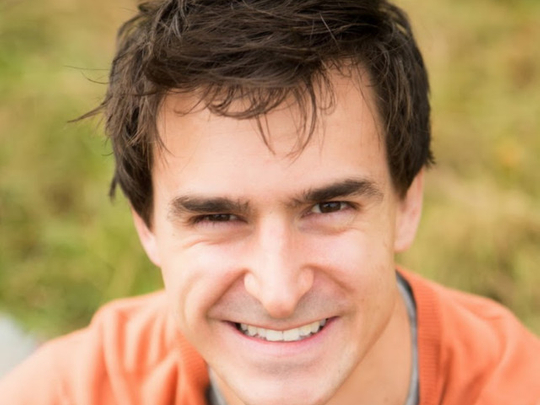
Author and research scientist Lewis Dartnell’s recently published “The Knowledge: How to rebuild our World from Scratch” is based on a thought experiment looking at how civilisation could be revived in a post-apocalyptic world following some kind of major catastrophe — such as a viral pandemic or asteroid strike.
“The reason I wrote this book is simply curiosity,” Dartnell tells Weekend Review. “Something I have been mulling for a number of years and I realised that no book like that has ever been written before. No one has ever talked about the fundamentals of civilisation and how you can recreate for yourself if you needed to.”
A United Kingdom Space Agency research Fellow at the University of Leicester, Dartnell works in the field of astrobiology — or to word it more interestingly — the hunt for aliens. His first book, “Life in the Universe”, was a beginner’s guide to astrobiology. The next one was called “My Tourist Guide to the Solar System”.
However, his latest offering is a completely different topic. “It is not about space and astrobiology,” he tells me, sitting in a café inside the busy St Pancras Station, London, where I met him for the interview. He says his book is “all about the things we take for granted, things that support our lives daily”.
Working on it, Dartnell met a large number of people. The bibliography contains references of 300-400 books he read to get the knowledge which was subsequently condensed in his writing. “But I didn’t want to just only interview people and only read from books,” he says. “I thought it would be very important to get some first-hand experience as well.”
Dartnell learnt, for example, how to make a steel tool from scratch. “I made a knife at a blacksmith’s, working with a hammer and anvil, kind of transforming the metal.”
There is a diagram in the book on how to build a radio out of junk, like people did during the Second World War in POW camps. “You can invent radio ludicrously easily for yourself using the right application of knowledge,” he says.
Another do-it-yourself exercise Dartnell performed was taking his author picture displayed on the inside cover at the end of the book. He created it using simple chemistry rather than a digital camera. “I went to the Fox Talbot museum, which is the place where photography was invented in the 1840s. And we went right back to that kind of primitive technology, recreated it all with the help of a photographic historian. Working with him we created that photo from scratch.”
One of the most surprising findings for Dartnell was researching how cars and trucks could run without gasoline. “It turns out that you can use a process called pyrolysis or gasification of wood,” he says. “If you heat that wood and break it down it, releases vapours and gases. If you pipe those off from the gasification unit, which you can strap it on the back of a car, and pipe those gases into the cylinders of the engine in the front — you can run a car not on diesel, but on wood.”
This process was used during the Second World War, when there were over a million wood-powered cars. The German army even had a division of tanks that were wood-powered.
Even assembling something as simple as a pair of spectacles, which have been around since 1200s, would be an alien concept for many people. “How many of us walking down the street and not going to Specsavers or Vision Express, have had to make a pair of glasses ourselves so we could see properly?” Dartnell asks.
“Something as basic as that — how do you make glass substance, how do you grind that substance into a lens to focus the light and allow you to see? How do you make the metal frame that you build to hold the lens? How do you smelt the metal from the ore, having dug ore out of the ground in the first place? How do you get the coal you need to use in your smelt?”
One interesting but “scary” person Dartnell met during his research was Vinay Gupta from University College London. “He does a lot of consultancy work on stopping civilisation collapse,” Dartnell says. “How can you make civilisation infrastructure more resilient and resistant to collapse? And he scares me because you keep getting this realisation that he is probably not crazy at all. He is probably absolutely right about things he is talking about and how vulnerable our society really is.”
A lot of people aren’t aware how susceptible society might actually be to sudden collapse, Dartnell says. “No one alive today has the knowledge any more about how to grow food for ourselves, how to make things for ourselves, how to build things, how to do things. We rely on the infrastructure and the network to do it for us. But because everything is so interlinked and interconnected nowadays with the electricity supply and the water supply and the gas supply and food production and transport, for just one of those things to fail, the repercussions would ripple.”
Civilisation could suffer a domino effect where everything gets dragged down very rapidly. “Unlike the black death or bubonic plague in the mid 1300s when a third of the population of England died in a matter of years, civilisation itself didn’t collapse. It got on and the feudal system kind of continued for some time. And I do not think that would be the case if the world were to lose a third of our population over the next year.”
In fact there are people known as preppers who are already preparing for the world’s end. “There are, particularly in America, a large community of people who for whatever reasons believe that civilisations, society, will collapse during their lifetime. They are preparing for that eventuality. They stock food and bottled water and shot guns and various tools and things and hide themselves away in fortified, secure locations. Or at least have somewhere they can run quickly if they need to.”
Dartnell himself isn’t a prepper. “This book really isn’t a prepper’s book. It is a book for all of us in the everyday world that explains the science behind the world that we created. But clearly if you do think our world is about to end, this is the book you would need.”
But what if Dartnell’s book does not survive in a post-apocalyptic world? “One of the footnotes is kind of tongue-in-cheek — that if you are concerned about the end of the world, or you love your friends and family, what you do is buy 10 copies of this book, 20 copies, and give them to everyone you know. And tell them to bury it at the bottom of their garden to improve the chances of at least one of the copies survive. And then help people that you know.”
Dartnell says his book contains the “genetic information” needed for its own reproduction. “Only one single copy of that book needs to survive the apocalypse and it contains the information needed to copy it endlessly and give a reproduction, a copy, to everyone that needs one.”
However the post-apocalyptic world is only one of a number of scenarios where the knowledge contained in Dartnell’s book could come in handy. “You can talk about falling through a time warp to 10000BC and what you would want to know to rebuild your civilisation and accelerate it,” he says. “So by the time you get to 2000 AD you are further advanced. How can you accelerate that progression of civilisation? Or if you are in the future and you are a star-ship captain and you crash-land your spaceship on another Earth-like planet, how do you start from scratch there?”
The reason Dartnell choose the post-apocalyptic scenario is because many people are familiar with the idea. “We have all seen films such as ‘The Road’ or ‘I Am Legend’. There is a bunch of computer games and sci-fi novels that deal with this issue.”
Dartnell has appeared in a number of documentaries, such as “BBC Horizon”, “Wonders of the World” and “Sky at Night”. He has also worked with the famous Professor Brian Cox, consulting on some of his “Wonder” series and helping with the script for “The Science of Dr Who”.
“I flew out to Atacama Desert to film with him a year or so ago. We have worked together in the past.”
Dartnell was also featured as a DVD extra for the sci-fi film “Monsters”. “Talking about the science, the real knowledge, behind the possibility of aliens in this moon Europa and what they might be like,” he says.
I ask if he gets contacted by the ‘weirder’ elements of society — such as people claiming to have found an alien in their backyard. “I have got a folder in my inbox called ‘cranks’, where some e-mails get placed when people ask me about UFOs and things,” says Dartnell, “because although I believe there is alien life out there, and bear in mind we are talking about bacteria, simple life on a place like Mars. You would call that life alien because it is on a different planet.
“I don’t believe in bug-eyed monsters coming to Earth. I don’t believe UFOs, flying saucers or spacecraft are kind of buzzing the White House or things like that. I think there is a very clear difference between possibility of bacteria on Mars and people seeing UFOs and being abducted.”
Hopefully his scepticism about bug-eyed monsters and UFO abductions is well founded. A more realistic threat appears the sense of alienation from centuries of accumulated knowledge which contemporary society takes for granted.
“All of us in the modern world and developed world I think we feel the sense of disconnect, dissatisfaction, that we don’t really understand how things are actually made or done for us,” says Dartnell. “It is kind of done somewhere else. It is done in a distributive way by civilisation and no one person on the planet knows enough about everything to kind of start it all over again and that is what I have tried to address with this book as well as try to write about it.”
Book details:
The Knowledge: How to rebuild our World from Scratch
By Lewis Dartnell, Bodley Head, 352 pages, £20








